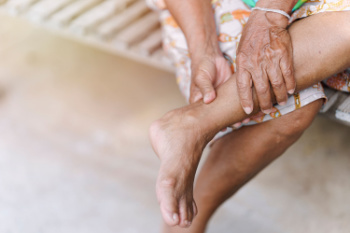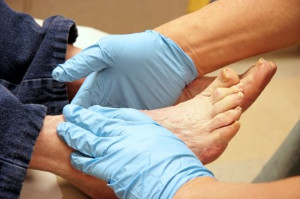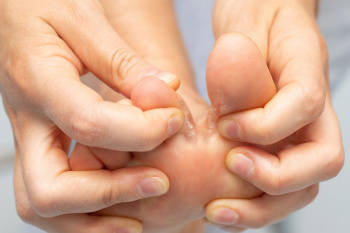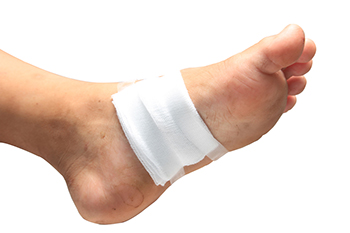Items filtered by date: November 2024
Plantar Warts Can Be Treated!
Proper Foot Care for Better Mobility

Taking care of your feet is critical for maintaining mobility, especially as we age or for those with conditions like diabetes that increase the risk of foot issues. Healthy feet support balance, movement, and independence, while neglected foot care can lead to pain, infections, or poor circulation, all of which hinder mobility. Basic foot care includes washing and drying feet thoroughly, trimming nails straight across to avoid ingrown nails, and moisturizing to prevent dry, cracked skin. Wearing well-fitting, supportive shoes also minimizes strain and prevents injuries. Regular checks for any cuts, blisters, or swelling are essential, as these can escalate if unnoticed, especially for those with diabetes. For specialized foot concerns or to prevent complications, it is suggested that you consult a podiatrist who can provide guidance, offer custom orthotics, and treat emerging issues, helping you maintain active, pain-free mobility.
Everyday foot care is very important to prevent infection and other foot ailments. If you need your feet checked, contact Yvonne Umezurike, DPM from Umez Podiatry. Our doctor can provide the care you need to keep you pain-free and on your feet.
Everyday Foot Care
Often, people take care of their bodies, face and hair more so than they do for their feet. But the feet are a very important aspect of our bodies, and one that we should pay more attention to. Without our feet, we would not be able to perform most daily tasks.
It is best to check your feet regularly to make sure there are no new bruises or cuts that you may not have noticed before. For dry feet, moisturizer can easily be a remedy and can be applied as often as necessary to the affected areas. Wearing shoes that fit well can also help you maintain good foot health, as well as making it easier to walk and do daily activities without the stress or pain of ill-fitting shoes, high heels, or even flip flops. Wearing clean socks with closed shoes is important to ensure that sweat and bacteria do not accumulate within the shoe. Clean socks help to prevent Athlete’s foot, fungi problems, bad odors, and can absorb sweat.
If you have any questions, please feel free to contact our offices located in Baltimore, MD and Washington DC . We offer the newest diagnostic and treatment technologies for all your foot care needs.
The Role of Caregivers in Diabetic Foot Care

Caregivers play a critical role in assisting diabetic patients with foot care, significantly impacting ulcer prevention and overall health management. Daily foot checks are essential to catch early signs of problems like cuts, blisters, or calluses, which can quickly worsen in diabetic individuals. By regularly inspecting feet, caregivers help detect issues before they escalate, preventing complications that could lead to ulcers or infections. Education is another key aspect. Caregivers can reinforce proper foot care practices, including washing, moisturizing, and avoiding tight shoes. They may also assist with wound care, ensuring any cuts or sores are cleaned, dressed, and monitored. If you have diabetes, it is suggested that you ask for help, even from an informal caregiver, and schedule regular visits to a podiatrist for professional evaluations, toenail care, and customized care.
Diabetic foot care is important in preventing foot ailments such as ulcers. If you are suffering from diabetes or have any other concerns about your feet, contact Yvonne Umezurike, DPM from Umez Podiatry. Our doctor can provide the care you need to keep you pain-free and on your feet.
Diabetic Foot Care
Diabetes affects millions of people every year. The condition can damage blood vessels in many parts of the body, especially the feet. Because of this, taking care of your feet is essential if you have diabetes, and having a podiatrist help monitor your foot health is highly recommended.
The Importance of Caring for Your Feet
- Routinely inspect your feet for bruises or sores.
- Wear socks that fit your feet comfortably.
- Wear comfortable shoes that provide adequate support.
Patients with diabetes should have their doctor monitor their blood levels, as blood sugar levels play such a huge role in diabetic care. Monitoring these levels on a regular basis is highly advised.
It is always best to inform your healthcare professional of any concerns you may have regarding your feet, especially for diabetic patients. Early treatment and routine foot examinations are keys to maintaining proper health, especially because severe complications can arise if proper treatment is not applied.
If you have any questions, please feel free to contact our offices located in Baltimore, MD and Washington DC . We offer the newest diagnostic and treatment technologies for all your foot care needs.
Managing Athlete’s Foot

Athlete's foot, a common fungal infection, primarily affects the skin between the toes and on the soles of the feet. It thrives in warm and moist environments, making communal areas like pools and locker rooms prime breeding grounds. The main causes include direct contact with the fungus, damp socks, and poor foot hygiene. Symptoms typically include itching, burning, and peeling skin, in additon to redness and cracking, which can lead to more severe complications if untreated. Individuals may also experience blisters and a persistent odor. A podiatrist can effectively diagnose and treat athlete's foot. They may prescribe antifungal medications, recommend proper foot care routines, and provide advice on footwear to prevent future infections. In some cases, they might suggest lifestyle changes to minimize exposure to the fungus. If you are experiencing symptoms of athlete's foot, it is suggested that you schedule an appointment with a podiatrist for tailored advice and treatment.
Athlete’s foot is an inconvenient condition that can be easily reduced with the proper treatment. If you have any concerns about your feet and ankles, contact Yvonne Umezurike, DPM from Umez Podiatry. Our doctor will treat your foot and ankle needs.
Athlete’s Foot: The Sole Story
Athlete's foot, also known as tinea pedis, can be an extremely contagious foot infection. It is commonly contracted in public changing areas and bathrooms, dormitory style living quarters, around locker rooms and public swimming pools, or anywhere your feet often come into contact with other people.
Solutions to Combat Athlete’s Foot
- Hydrate your feet by using lotion
- Exfoliate
- Buff off nails
- Use of anti-fungal products
- Examine your feet and visit your doctor if any suspicious blisters or cuts develop
Athlete’s foot can cause many irritating symptoms such as dry and flaking skin, itching, and redness. Some more severe symptoms can include bleeding and cracked skin, intense itching and burning, and even pain when walking. In the worst cases, Athlete’s foot can cause blistering as well. Speak to your podiatrist for a better understanding of the different causes of Athlete’s foot, as well as help in determining which treatment options are best for you.
If you have any questions please feel free to contact our offices located in Baltimore, MD and Washington DC . We offer the newest diagnostic and treatment technologies for all your foot and ankle needs.
Types of Wound Care Materials for Diabetic Foot Ulcers

Diabetic foot ulcers occur due to a combination of poor circulation and nerve damage, making even minor injuries prone to infection. Wound care materials vary depending on the type and severity, or grade, of the ulcer. For superficial ulcers, Grade 1, foam dressings and hydrocolloid dressings are commonly used, as they maintain a moist environment and promote healing. For deeper Grade 2 ulcers, alginate dressings, which absorb excess wound fluid, are beneficial, along with silver-infused materials to prevent infection. More severe ulcers, Grades 3 or 4, often require advanced wound care, including negative pressure wound therapy to promote tissue regeneration, and bioengineered skin substitutes to cover exposed bone or tendons. Debridement, the removal of dead tissue, is often necessary to prevent further infection. Proper care and regular monitoring are imperative to healing diabetic foot ulcers and avoiding complications like infection or amputation. If you have any type of diabetic foot ulcer, it is strongly suggested that you include a podiatrist on your health care team for proper care.
Wound care is an important part in dealing with diabetes. If you have diabetes and a foot wound or would like more information about wound care for diabetics, consult with Yvonne Umezurike, DPM from Umez Podiatry. Our doctor will assess your condition and provide you with quality foot and ankle treatment.
What Is Wound Care?
Wound care is the practice of taking proper care of a wound. This can range from the smallest to the largest of wounds. While everyone can benefit from proper wound care, it is much more important for diabetics. Diabetics often suffer from poor blood circulation which causes wounds to heal much slower than they would in a non-diabetic.
What Is the Importance of Wound Care?
While it may not seem apparent with small ulcers on the foot, for diabetics, any size ulcer can become infected. Diabetics often also suffer from neuropathy, or nerve loss. This means they might not even feel when they have an ulcer on their foot. If the wound becomes severely infected, amputation may be necessary. Therefore, it is of the upmost importance to properly care for any and all foot wounds.
How to Care for Wounds
The best way to care for foot wounds is to prevent them. For diabetics, this means daily inspections of the feet for any signs of abnormalities or ulcers. It is also recommended to see a podiatrist several times a year for a foot inspection. If you do have an ulcer, run the wound under water to clear dirt from the wound; then apply antibiotic ointment to the wound and cover with a bandage. Bandages should be changed daily and keeping pressure off the wound is smart. It is advised to see a podiatrist, who can keep an eye on it.
If you have any questions please contact our offices located in Baltimore, MD and Washington DC . We offer the newest diagnostic and treatment technologies for all your foot and ankle needs.




